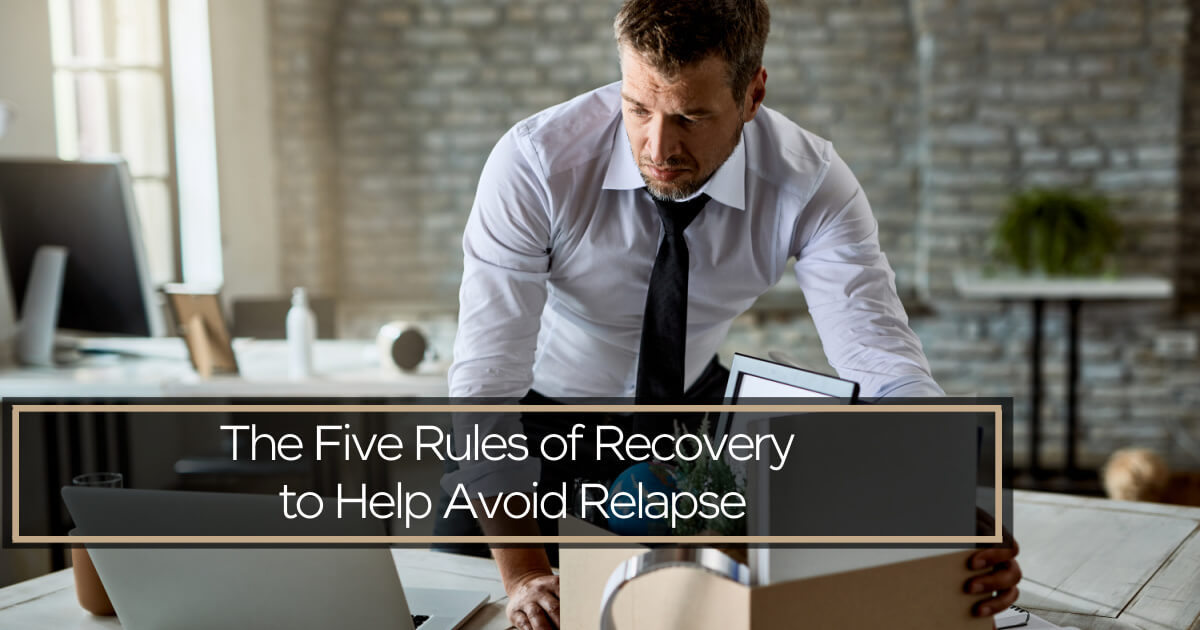Maintaining sobriety after drug and alcohol addiction treatment requires ongoing effort. The good news is that avoiding relapse in recovery and remaining sober is possible. Following the five recovery rules can reduce the risk of relapse and help you abstain from drug or alcohol use.
The Five Rules of Recovery
The five rules of recovery are an approach to maintaining sobriety. Adhering to them can help you during long-term recovery. Let’s review each of the rules…
-
Change Your Life
During addiction treatment, you likely identified people, places, and things that sparked negative thinking patterns and contributed to your alcohol or drug use. If you pick up where you left off once treatment ends, you’ll expose yourself to the same triggers as before recovery, increasing the risk of relapse.
To remain sober, you must modify your life to avoid high-risk situations for relapse. Compile a list of triggers and brainstorm how to prevent or limit your contact with said triggers. You may need to change jobs, adopt new hobbies, or move to a new area as a part of your new life post-treatment.
-
Be Completely Honest
Lying is a hallmark of addiction. When using substances, you likely fall into the habit of downplaying or hiding your behavior from others. Breaking out of this pattern is key to recovery. Prepare to be honest with yourself and others around you. Be transparent about your thoughts and feelings. Admit when you feel the temptation to return to drugs and alcohol and think before you speak to avoid falling back into the pattern of lying to cover up addiction.
-
Ask for Help
Successful recovery requires ongoing support. Create a recovery circle for yourself to ensure that you have the support you need. Fill it with close friends and family members that you trust, including health professionals, counselors, and people you meet in self-help groups such as Alcoholics Anonymous or Narcotics Anonymous.
Once you’ve created your recovery circle, reach out to these individuals regularly. Don’t be afraid to let them know when you’re struggling. Early on, you may feel guilt and shame about admitting your difficulties, but don’t let that stop you, as these negative emotions can trigger a relapse. Face them head-on by speaking your truth to others.
-
Practice Self Care
Many people turn to drugs and alcohol to cope with stress and symptoms of an underlying mental health condition. Substance use may have turned down the volume on the problems in your life at first, but it ultimately created new problems for you to address.
Now that you’re finished with recovery, you must find new, healthy ways to de-stress and reward yourself. Find or create opportunities to practice self-care on an ongoing basis. Try mind and body relaxation techniques such as deep breathing or engage in a wholesome hobby that you enjoy.
Eating a healthy diet and getting enough sleep are also important to help promote physical and mental well-being. Each time you make a healthy choice, you invest in yourself and foster self-love. Over time, these small, kind gestures to yourself can make you less likely to relapse.
-
Don’t Bend the Rules
Lastly, stick to your aftercare plan without bending the rules. Once you’ve committed to changing your life, don’t allow yourself one-time exceptions or make the terms negotiable. After all, “just this once” can open the door to a full relapse.
Recovery Support Is Available
If you’re struggling to maintain sobriety, you don’t have to face the challenges alone. The Dunes East Hampton has inpatient and outpatient programs for those who have relapsed – we follow up our addiction treatment programs with a case management program to help those creating a new life that’s free of drugs and alcohol continue their journey. Contact us today for more information about how we can help.








